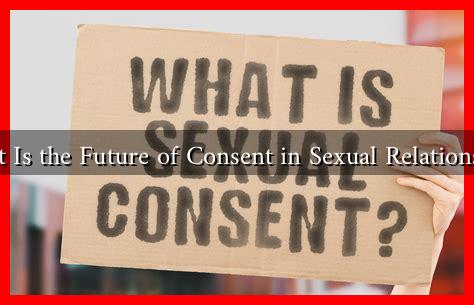-
Table of Contents
What Is the Future of Consent in Sexual Relationships
In recent years, the conversation surrounding consent in sexual relationships has gained significant traction. With movements like #MeToo and increased awareness of sexual violence, the understanding of consent has evolved. As society progresses, it is essential to explore what the future holds for consent in sexual relationships, considering legal, cultural, and technological dimensions.
The Evolving Definition of Consent
Traditionally, consent was often viewed as a simple “yes” or “no” in sexual encounters. However, this binary perspective is increasingly seen as inadequate. The future of consent is likely to embrace a more nuanced understanding that includes:
- Affirmative Consent: This model requires clear, enthusiastic agreement from all parties involved before engaging in sexual activity. It emphasizes that silence or lack of resistance does not equate to consent.
- Ongoing Consent: Consent is not a one-time agreement; it must be maintained throughout the sexual encounter. This means that individuals can withdraw consent at any point, and partners must respect that decision.
- Informed Consent: All parties should have a clear understanding of what they are consenting to, including the nature of the sexual activity and any potential risks involved.
Legal Implications and Changes
As societal attitudes shift, legal frameworks surrounding consent are also evolving. Many jurisdictions are beginning to adopt laws that reflect the modern understanding of consent. For example:
- Some states in the U.S. have enacted affirmative consent laws, requiring explicit agreement before sexual activity.
- Countries like Sweden have implemented a “yes means yes” standard, making it clear that consent must be actively given.
- Legal definitions of incapacitation are being refined to include various forms of impairment, such as intoxication or mental health issues.
These changes are crucial in providing a legal foundation that supports victims of sexual violence and holds perpetrators accountable. However, challenges remain, including the need for consistent enforcement and public education about these laws.
Cultural Shifts and Education
Education plays a vital role in shaping future attitudes toward consent. Comprehensive sex education that includes discussions about consent can help foster a culture of respect and understanding. Key components of effective consent education include:
- Communication Skills: Teaching individuals how to express their desires and boundaries clearly.
- Empathy Development: Encouraging individuals to consider the feelings and perspectives of their partners.
- Understanding Power Dynamics: Addressing how factors like age, status, and intoxication can affect consent.
Programs that engage young people in discussions about consent can lead to healthier relationships and reduce instances of sexual violence. For instance, organizations like RAINN provide resources and training to help educate communities about the importance of consent.
The Role of Technology
As technology continues to advance, it will undoubtedly impact how consent is understood and practiced. Some potential developments include:
- Digital Consent: The rise of dating apps and online interactions necessitates clear guidelines for consent in digital spaces. Users may need to navigate consent in text messages, video calls, and other online platforms.
- Consent Apps: Emerging technologies may offer tools for documenting consent, providing a record that can help protect individuals in case of disputes.
- AI and Consent: Artificial intelligence could play a role in educating users about consent and helping them navigate complex social interactions.
Conclusion
The future of consent in sexual relationships is poised for significant transformation. As society continues to challenge outdated norms and embrace a more comprehensive understanding of consent, we can expect legal, cultural, and technological advancements to shape this critical aspect of human interaction. By fostering open communication, promoting education, and leveraging technology, we can create a safer and more respectful environment for all individuals. Ultimately, the goal is to ensure that consent is not just a legal requirement but a fundamental aspect of healthy relationships.

